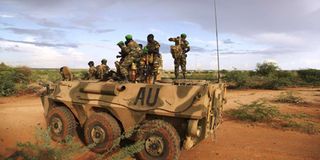Why simmering Gedo crisis might be Farmaajo’s Waterloo in Somalia

African Union peacekeepers on the outskirts of Burubow in the Gedo region of Somalia in March 2014. They had captured the town the previous month in a joint operation with Somali National Army (SNA) troops.
What you need to know:
- Kenya was instrumental in the election of Federal President Mohamed Abdullahi Mohamed alias Farmaajo (Italian for cheese) in 2017 with Gedo his political springboard.
- The region has been largely under control of the Al-Shabaab terrorist group.
Somalia’s southern State of Jubbaland is, arguably a stark contrast. It is tipped to be the country’s economic hub due to the nascent Kismayu port and agricultural potential. Conversely, it is war-ravaged with rogue Somali politicians using it to flex their political muscles.
The region has been largely under control of the Al-Shabaab terrorist group with the threat of terrorism spilling across the border to Kenya. This prompted a Kenya Defence Forces (KDF) intervention to restore peace and stability in the Horn of Africa nation.
Kenya was instrumental in the election of Federal President Mohamed Abdullahi Mohamed alias Farmaajo (Italian for cheese) in 2017 with Gedo his political springboard. But he engineered a policy to cut to size federal member states (FMS), especially those that performing better than the Federal Government of Somalia (FGS). Jubaland State was the first casualty with its Gedo region used as a guinea pig for centre-periphery wars.
Surprisingly, Farmaajo is from the Marehan sub-clan of the dominant clan in Jubaland, Darod, meaning he is fighting his people. And in a desperate move to appear nationalistic, he mischievously settled in Mogadishu.
Farmaajo’s beef with Gedo was fuelled by its proximity to Kenya. That meant he could kill two birds with one stone: Fight the Jubaland administration, led by the popular State President Sheikh Ahmed Mohamed Islaan alias Madobe, and wage war against Kenya.
Massive deployment of Ethiopian National Defense Force (ENDF) to Gedo to fight KDF and Jubaland Security Forces (JSF) loyal to Madobe explains the unending violence in Gedo and its environs, resulting in the killing of innocent citizens.
In addition, Al-Shabaab took advantage of the ‘friendly fire’ between Somalia National Army (SNA) and JSF to re-emerge and wreak havoc on civilians.
Toxic environment
Besides inciting the locals against the KDF-SNA collaboration, accusing the latter of sharing operational intelligence with Al-Shabaab, Farmaajo accused Nairobi of harbouring fugitive Jubaland Security Minister Abdirashid Hassan Abdinur and threatened military action against Kenya to rearrest him.
The toxic environment made KDF continued stay in Gedo untenable. To de-escalate tension in Gedo, it withdrew from Bardhere, Taraka, Busaar and Fafadhan military camps.
Farmaajo accused Madobe of being close to Kenya and vowed to oust him from office. During Jubaland State elections in August last year, in which he sponsored Anab Mohamed Dahir, Madobe nonetheless won by a landslide. Mogadishu then refused to recognise the outcome and deployed more Ethiopian troops to the state while threatening to install an alternative government there.
However, Madobe was recognised by the international community as the president of Jubaland and continued to govern the state.
In a surprise turn of events, in July, Farmaajo met with Madobe for the first time in three years. Analysts see the Dhusameeb, Galmudug State, meeting, part of preparations for the elections, as an indication that Farmaajo has swallowed his pride and recognised Madobe as he desperately seeks re-election.
Anti-KDF demonstrations
However, Farmaajo’s camaraderie with Madobe is cosmetic as FGS reportedly continues to foment violence in Gedo, including recent anti-KDF demonstrations after its local military operation against Al-Shabaab. Analysts see that as part of a strategy to delegitimise KDF and force its Amisom withdrawal.
It is also widely believed that a State-sponsored militia has been undergoing secret training in a neighbouring country since last year to work with Shield and Spear Force in forcing a Farmaajo victory in the February election. Most Somalis believe Farmaajo failed to achieve his manifesto, including securing the country, and turned out to be a war monger. The politically instigated violence could be his Waterloo in the election.
But the world cannot afford to see Somalia descend into genocide as it almost did in the Siad Barre era. It’s time the United Nations, or at least the African Union, intervened. And should the international community fail, as it has before, Somalis must salvage their country at the ballot, despite coercion.





